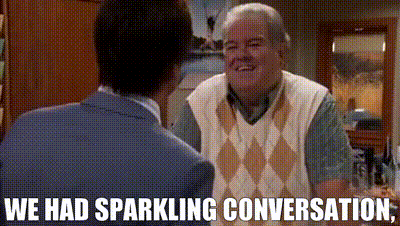When practicing the art of conversation, I have often painted on a small canvas with a very large brush, and covered up the thoughts and emotions of the other. When people tell me something wrong in their life, I am prone to paint over their pain with an easy fix which I quickly share in order to rescue them from their sorrow, suffering, or basic complaint. But, what it took me a lifetime to discover was that people don’t enjoy being painted over and remade into the masterpiece of my liking. That said, when it comes to oversharing, I tend to overshare advice, in an attempt to repaint your life into something I prefer and think you will too.
But, working with seniors in the most recent iteration of life, I have begun to see the folly of a TMI of another kind. I’ve noticed how many of us, as we age, tend to talk more than we listen and to overshare in hopes of getting help from people who truly can’t fix most of our problems. Like complaining to the nurse about a broken remote control, or to the repair man about the miserable food in the dining room. That’s why, recently, I’ve started an experiment of sorts. I’m trying to see if I can generate sparkling conversation in place of oversharing. I’m not expecting new tricks from a bunch of old dogs, but I am looking to see if the art of conversational brevity might bring more joy into the lives of the verbally incontinent.
In a famous line from Shakespeare's "Hamlet." Polonius noted that brevity is the soul of wit. Apparently, Will understood that using fewer words is a sign of true intelligence. In other words, Shakespeare agrees with my premise that brevity is better than TMI. Oversharing is not a mark of sparkling conversation but brevity just might be.
So, what is the art of brevity anyway, you ask as I ramble on and on? Good question. Brevity in conversation is simply this, talking less and listening more. This lesson isn’t just for the elderly, but for everyone from 4 - 94. As soon as we can talk, we all seem to think that everyone around us exists just to listen to us and answer our questions. Producing and directing 25 elementary students in our Christmas pageant last year was all the proof I needed to declare that little humans don’t know how to stop talking. We are born that way, and the only way we learn what too much information is, is through education. Have you been educated in the art of brevity or are you still on the auto-pilot you were born with, sharing every thought that comes into your mind with anyone who will listen? Or are you like me, a fixer, looking for holes in logic that need filling? Either way, we both could benefit from a little lesson on the art of brevity and sparkling conversation. So, here are some things that are new (to me) and I hope they aren’t completely new to you, but are a helpful reminder to listen more than you speak:
Edit your speech: Learn to distinguish between relevant and irrelevant information when you talk to people. The rule of thumb for sparkling conversation is edit, edit, edit. Before you say anything, edit yourself. If you cut out 50% of what you want to say, you will become a better conversationalist instantly. Usually half of the goal of talking to someone is getting something off your chest, whether good or bad. That is because we often share information in order to download our day, but most of the time that only makes people a dumping ground for our troubles. If you consider others better than yourself (see Php 2:3), brevity becomes a very easy job as you realize that most of what you want to say puts your importance ahead of the other’s.
Complaint makes for flat conversations - If you want sparkling conversation, don’t complain. When you are determined to do everything without complaining (see Php 2:14) then this becomes a lot easier. The idea that people want to hear your complaint as a response to, “How are you today,” is a pipe dream. Complaint is not what they are going for with that question. It often feels good and honest to complain, and it can bond people, but complaint only serves to drive you farther and farther away from contentment and peace, both of which are a gain we should all want to attain (See 1 Tim 6:6).
Talk about things that are relevant to your listener, not just things you want to talk about: In order to be a good conversationalist you have to ask good questions. And, asking good questions is a great way to make the conversation more about them than you. Here are some good Qs for sparkling conversation:
What's something you're currently passionate about or excited to pursue?
What is God doing in your life these days?
What was your favorite year in school?
What's the most interesting thing you've learned recently?
What's a challenge you've faced recently, and how did you overcome it?
What's a childhood memory that always brings a smile to your face?
What's a piece of advice that has stuck with you over the years?
Tell me about a skill you have that not many people know about.
If you had a day completely to yourself, how would you spend it?
Care about their answers: There is something unfulfilling about being asked a question about yourself and then getting nothing back in response. It makes you feel like you were tricked into thinking the person cared when they really didn’t. When we ask more questions about the topic after they answer, and don’t just change the subject as if what they said was insignificant we show that we truly care about what they have to say. If you don’t at least talk about what they said for 30 seconds, it will feel like you did not even hear them, or think what they said was interesting. So, comment on their response, or ask them another question about the same topic to keep the conversation going.
Get more than you give: In sparkling conversation the sparkliest person is the one who gets more words than gives them. When you try to make 75% of your conversation about the other rather than about yourself, people feel the love. I once read that to outdo one another in showing honor was the way to truly love another (see Romans 12:10). Honor in conversation isn’t just about giving someone else accolades for something they have done, but it also involves making their life important to you. It’s about listening to them in an attempt to honor their thoughts, their feelings, and their presence. A lot of times, I don’t have time for people who want to dump on me, and I want to cut them short, but when I consider the job of giving honor something that I should excel at, it makes it easier to listen when all I want to do is to run away. But, imagine if we were all working at outdoing one another in showing honor, how would conversations change across the board? There would be no more running when the other way when the over-sharer crossed our paths because she would be more self-aware and less concerned about telling us about every boring detail of her life.
Care enough to remember: When you can remember something they told you in a previous conversation and ask them about it, your conversation will surely sparkle. It’s such a kindness to remember what people tell you, and how will they know you remember, if you don’t ask them about it later. You would be amazed at how surprised people are when you show that you remembered something about them and their life.
There is power in a pause: Sparkling conversation requires pauses. If you never pause, then you are talking too much and the other person is drowning in your words. Sure, you might feel like you’ve taken a load off, but the other person feels like they’ve been dumped on. In order to love others, you have to leave room for them in the conversation.
The key to sparkling conversation is learning to put the other person first. That means at the heart of it all is love. When you love someone, you are being selfless, and in conversation that means caring about what the other person has to say more than you care about what you want to say. In school, I remember learning how to do math, and run experiments, I learnt about history and society, but I never learnt the art of conversation or how to love through listening. If only the main goal of education was to teach us to love. Imagine a world where everyone loved others selflessly. It would be heaven. When we love others through sparkling conversation, the power, beauty, and kindness of a God who searches us, and knows us, who hears every word before it even makes it to our tongue and doesn’t run in the opposite direction manifests itself in our emulation of his selfless love.









Hi Hayley, I really appreciated your article. If as Christans we listened well, I believe we would have a more effective impact on our world.
"Verbally incontinent." Oh my, convicting. Thanks for the great tips!